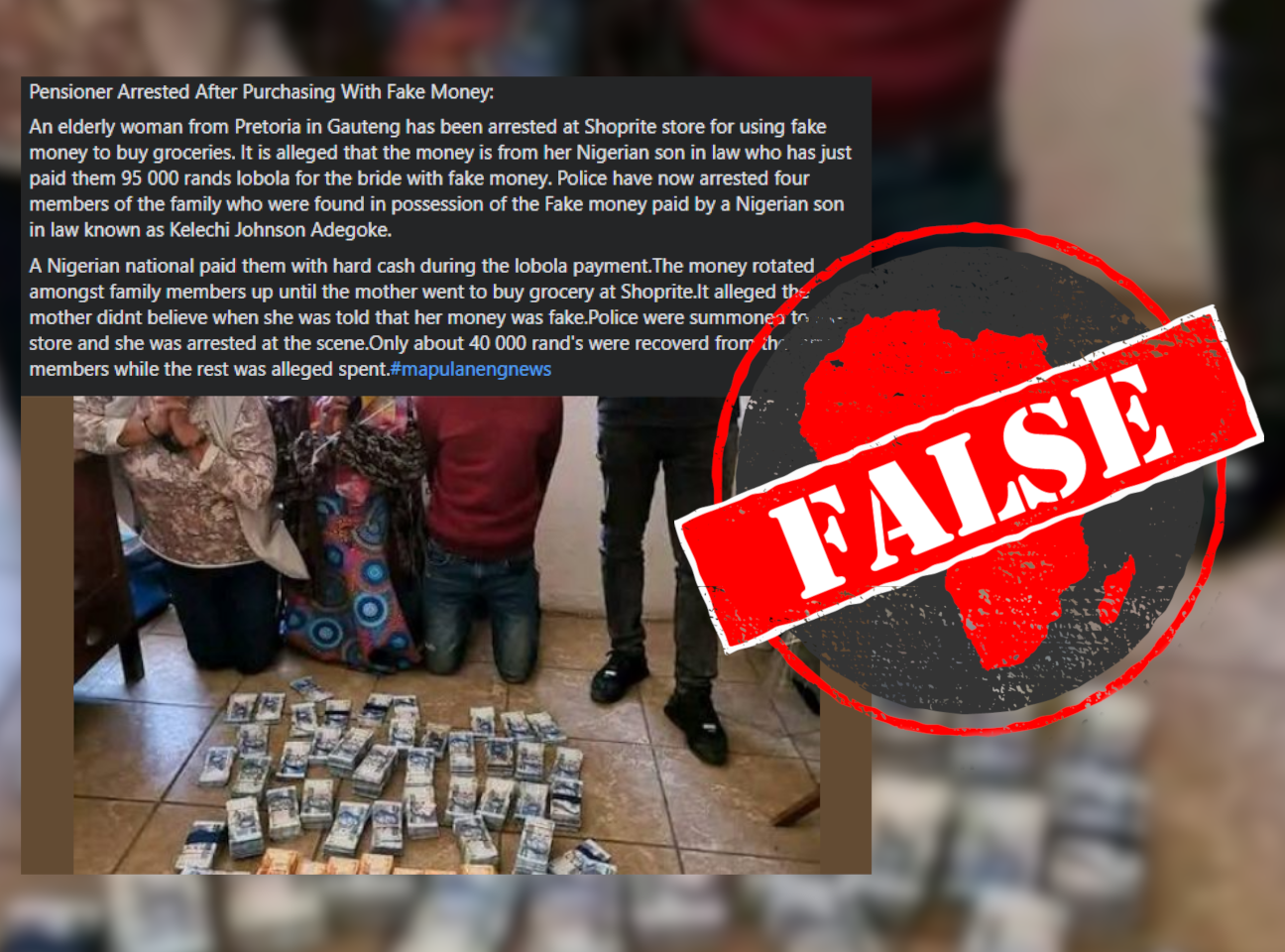IN SHORT: A photo doing the rounds on social media in January 2024 doesn’t show a South African woman arrested for spending counterfeit notes from her Nigerian son-in-law’s lobola payment. It’s an old photo of four people arrested in 2021 for possessing counterfeit money.
A photo has been shared several times on social media, with the claim it shows a South African woman arrested for spending counterfeit money given to her by her Nigerian son-in-law.
It shows three people kneeling and one standing, their hands cuffed, with piles of cash in front of them on a tiled floor.
One of the captions begins: “An elderly woman from Pretoria in Gauteng has been arrested at Shoprite store for using fake money to buy groceries.”
“It is alleged that the money is from her Nigerian son in law who has just paid them 95 000 rands lobola for the bride with fake money.”
Lobola is a marriage tradition in South Africa where the groom's family gives gifts to the bride’s family, signifying the union between the two families. The gifts can be cattle or cash. It is a form of bridewealth.
The same photo with different captions appeared on Facebook here, here, here, here, here, here, here, here, and here. The story was also shared on X (formerly Twitter) here, where it had been viewed over 1.8 million times, as well as here and here. It was also posted to Instagram here.
The posts go into different levels of detail about the supposed crime, some mentioning amounts of money paid and later recovered, and others identifying the groom by name.
But does this photo show a woman arrested for spending counterfeit lobola money from her Nigerian son-in-law? Such claims could fuel anti-immigrant sentiment in South Africa.
We checked.

Photo from 2021, unrelated to the claim
A Google reverse image search of the photo led us to a South African Police Service statement dated 21 August 2021.
It said four suspects had been arrested in Auckland Park, Johannesburg for being in possession of counterfeit currency to the value of R2 million (roughly US$107,400).
Police arrested the suspects following a tip-off and confirmation that the notes were forged.
There was no mention of whether the people arrested were Nigerians or whether the money came from a lobola payment.
The arrests were also reported by local media at the time.
South African police refuted a similar claim on 27 January 2024, which had said the incident took place in a different area, Rietgat.
“The Police would like to repudiate those allegations. The police visited a local Shoprite store and spoke to the Manager who denied claims that their store caught anyone paying with fake money. There is also no such case registered at Rietgat and the neighbouring Police Stations,” the statement said.
“The sharing of misinformation puts the South African Police Service at a disadvantage because all the allegations of crime have to be investigated. This leads to the Police utilising State resources and losing valuable time that could have been better utilised to investigate real incidents.”
“Eventually that also disadvantages victims of crime and hampers service delivery."
Republish our content for free
For publishers: what to do if your post is rated false
A fact-checker has rated your Facebook or Instagram post as “false”, “altered”, “partly false” or “missing context”. This could have serious consequences. What do you do?
Click on our guide for the steps you should follow.
Publishers guideAfrica Check teams up with Facebook
Africa Check is a partner in Meta's third-party fact-checking programme to help stop the spread of false information on social media.
The content we rate as “false” will be downgraded on Facebook and Instagram. This means fewer people will see it.
You can also help identify false information on Facebook. This guide explains how.


Add new comment